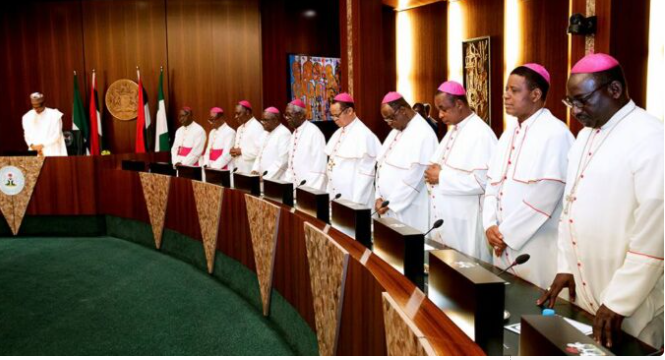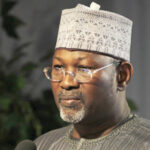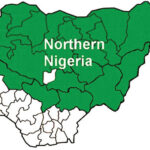The Catholic Bishops from the 16 West Africa countries have elected new leaders that would pilot the affairs of the Reunion of Episcopal Conferences of West Africa (RECOWA) in the next three years.
This is contained in a communique at the end of week-long 4th General Assembly of the RECOWA, held in Abuja and presented to reporters on Saturday in Abuja.
- W/Africa Catholic bishops want actions against insecurity
- The leaders Nigeria needs in 2023 – Catholic Bishops
The RECOWA was previously headed by the Metropolitan Catholic Archbishop of Abuja, Most Revd. Ignatius Ayau Kaigama.
The meeting with the theme ‘Fratelli Tutti: Path to Build Brotherhood and Sustainable Peace in West Africa’ was attended by Vice President Yemi Osinbajo, who represented President Muhammadu Buhari.
The communiqué read by the Bishop, Diocese of Oyo, Most Rev. Emmanuel Adetoyese Badejo, on behalf of the newly elected President of RECOWA, Most Rev. Alexis Touabli Youlou, also called on Christian politicians, business men and others to live out their Christian vocation in fighting corruption, ethnocentrism, sectionalism and other societal ills.
“At the end of our deliberations, we held elections and the following emerged as the leaders of the reunion for the next three years; Most Rev. Alexis Touabli Youlou, diocese of Agboville Cote D‘ivoire, President; Most Rev. Joseph Kwaku Afrifah-Agyekum, Bishop of Koforidua, Ghana, First Vice President; and Most Rev. José Lampra CA , Guines Bissau, second Vice President.
“Also elected to run the secretariat of the reunion are Father Vitalis Anaehobi, Secretary General, Nigeria; Father Vincent de Paul Boro, Deputy Secretary General and Father Celestine Sagna, second Deputy Secretary,” the communique read.
The West African Catholic Bishops urged politicians especially in the sub-region on their never-ending crave for personal aggrandizement and acquisition of wealth at the expense of the populace.
“As Church, we call on politicians, other leaders and indeed our people to order in their never-ending craving for self-aggrandizement and acquisition of wealth. We urge Christian politicians, traditional rulers, technocrats, professionals, especially those in the media, business men and women, and indeed all our people to live out their Christian vocation in fighting corruption, ethnocentrism, sectionalism, and all forms of injustice in society.
“We strongly denounce the policies and practices of our governments and leaders who facilitate and permit the exploitation and marginalization of our people and endanger the future of our children. Tragically some individuals engaged in acts of violence and terrorism have aggravated the state of insecurity in our sub-region. We call on all never to grow weary in denouncing and rooting out such evils in our midst,” it reads.
The communique added that the bishops recognize the inherent dangers in the current society.
It said, “We count greatly on the flickers of hope resonating in various spheres. We remain optimistic that none of the problems bedeviling our sub-region is insurmountable. However, we need to work together, with like minds in politics, religion, economics, social life, the media, in synergy to fight against all forms of man ‘s inhumanity to man.”
On the Bishops’ concrete considerations, the communique said “In our deliberations, it became evident that Fratelli Tutti can help us in our responsibility of engendering effective pastoral governance and greater social friendship in West Africa and in the entire world.
“We all, bishops, priests, consecrated persons and the lay faithful are reminded that we are, as Jesus emphasized, the salt of the earth. Given that many of our people are suffering, we are admonished to show greater Christian commitment to alleviate their sorrows and give them reason to continue living.
“The past two years of the COVID-19 pandemic made us recognize that at the end of the day we are all one family. It opened our eyes to the fact that we cannot face our problems alone or in isolation. Therefore, we must guard against the culture of indifference and individualism.
“We must always come together in solidarity to work for our common good. The example of the good Samaritan in the gospel must compel us to admire the attitude of the Samaritan towards the Jewish brother. We recall that the priest and the Levite passed him by, indifferent to his needs.
“One is truly touched by the risk taken by this Samaritan. It was Pope Francis who juxtaposed the role of those who alleviate the sufferings of others and those who simply pass by the suffering of others. We bishops therefore urge Christians and all people of good will in our sub region to overcome various barriers so as to reach out to others in need.
“We feel called to give stronger witness to our Christian values. Our people are hungry, dehumanized and suffering; our youth are exposed to life-threatening adventures on the high seas in their bid to discover greener pastures in overseas countries. We are called upon to give hope to these people.”

 Join Daily Trust WhatsApp Community For Quick Access To News and Happenings Around You.
Join Daily Trust WhatsApp Community For Quick Access To News and Happenings Around You.


